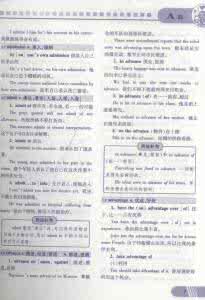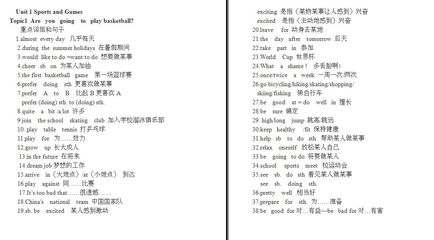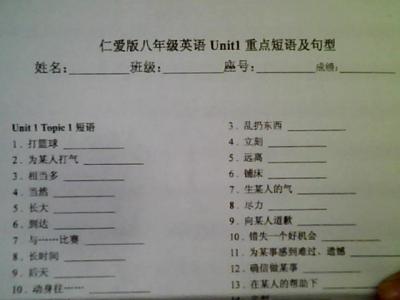实用高中英语短语与句型词典
impress
1. impress sb as… 给某人的印象是……。如:
He impressed me as an honestman. 他给我的印象是很老实。
She impressed me as a woman of greatkindness. 在我的印象中,她是一位非常仁慈的女性。
注:该句型中 as后的情况指的通常是句子主语,而不是impress后的宾语。如:
She impressed me as being very rude.
正:在我的印象中,她很粗鲁。
误:她对我的印象是我很粗鲁。
2. impress sb with sth
(1) 某事给某人留下深刻印象。如:
He impressed me with hiscourage. 他的勇敢给我留下了很深的印象。
They impressed us with theirperformance. 他们的精彩表演给我们留下了很深的印象。
注:有时用 sb is impressed with [by, at] sth这样的被动结构。如以下各句也可说成:
I was impressed with [by, at] hiscourage.
We were impressed with [by, at] theirperformance.
(2) 使某人铭记某事物,向某人强调某事物。如:
I will impress you with onething. 我向你强调一件事。
He impressed me with the importanceof work. 他要我铭记工作的重要性。
注:该结构也可用 impress sth on sb / impress on sbsth表示。如以上两句也可说成:
I will impress one thing on you.
He impressed the importance of workon me. / He impressed
on me the importance of work.
3. impress sth on [upon] sth 把某物印在某物上。如:
He impressed his name on thebox. 他把自己的名字印在盒子上。
His words are strongly impressed onmy memory. 他的话深深印在我的记忆里。
impression
1. beunder the impression 认为,以为。如:
We were under the impression thatthey were brothers. 我们认为他们是兄弟。
He was under the impression that sheliked him. 他以为她喜欢他。
注:不要类似于 in one’s opinion 而说 in one’s impression这样的短语,后者不合英语习惯。
2. givesb an impression 给某人留下印象。如:
He gave her a good impression.他给她留下了很好的印象。
She gave me the impression of a nicegirl. 她给我印象的印象是,她是个不错的女孩。
3. have[get] the impression 有……的印象,记得,认为。如:
I have [get] the impression that hedoesn’t smoke. 我记得他不抽烟。
Everyone had the [an] impression thatshe was a goodmatch for the young man. 每个人都认为她和那个年轻人是天造地设的一对。
4. makean impression on sb (sth) 给某人留下印象,对某人(某事物)起作用。如:
He made a good (bad) impression onthe teacher. 他给老师留下了很好(很坏)的印象。
The rain made little impression onthe dry fields. 这场雨对干旱的田地没起什么作用。
注:有时用动词 leave。如:
The book left [made] a deepimpression on him. 这本书给他留下了深刻的印象。
5. Whatare you impressions about [of]……你对……的看法如何? 如:
What are you impressions about [of]Shanghai? 我觉得上海如何?
What are you first impressions about[of] our school? 我对我们学校的第一印象是什么?
improve
1. improve in sth 在某一方面有所改进。如:
He is improving in health.他的健康状况正在好转。
比较:His health is improving.
2. improve on [upon] 对……改进,比……更好。如:
I’m unable to improve on hissuggestion. 我提不出比他更好的建议了。
He has never improved on his firstbook. 他再也没有写出他的处女作更好的书来。

比较以下各组句子:
He has improved her poem.他已经修改了她的诗。
He has improved on her poem.他写的一首诗比她的诗更好。
The poem cannot be improved.这首诗没有什么可改的地方。
This poem cannot be improvedon. 这首诗已经够好了,再也写不出比这更好的了。
in
2. indoing sth 在……时,在做……的过程中。如:
In doing this, we can improve ourEnglish. 我们这样做时,可以提高我们的英语水平。
You should be very careful inlistening to the teacher. 你在听老师讲课时,应当很仔细。
2. inthat因为,既然。如:
He didn’t come in that he wasill. 他因病未来。
In that he killed the man, he was amurderer. 他既然杀了这个人,他就是凶手。
include
1. include doing sth 包括做某事。如:
My job doesn’t include making coffeefor the boss. 我的工作不包括给老板冲咖啡。
Your duties will include putting thechildren to bed. 你的职责包括照顾孩子就寝。
2. including sth (sb) 包括某人(事物)在内。如:
We all went including me.所有人都去了,包括我在内。
Price $10,including postage.定价10美元,包括邮资。
注:该表达也可说成 sth (sth) included, 所以以上两句也可说成:
We all went me included.
爱华网 www.aIhUaU.com欢迎您转载
 爱华网
爱华网



